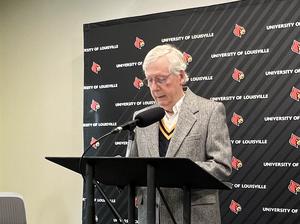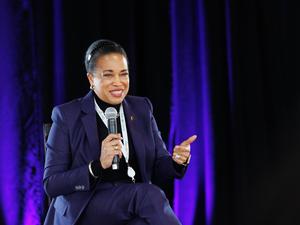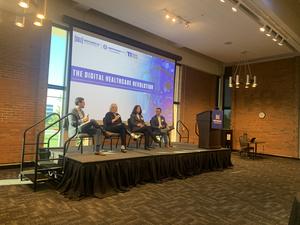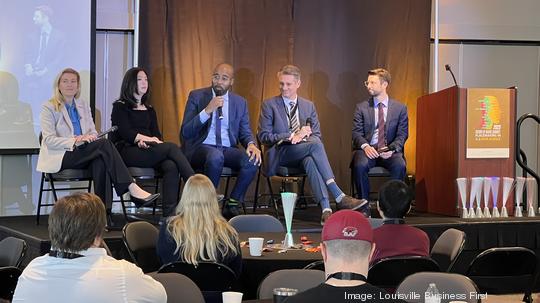
Chatbot, write me approximately 1,000 words on a summary of what took place on Tuesday at the 2023 Future of Work Summit at the Muhammad Ali Center … Just kidding.
While ChatGPT and Open AI were the topics of many conversations at the tech event in Downtown Louisville, that was far from the only storyline.
The event’s master of ceremonies, Ben Reno-Weber, did in fact ask the "co-host": ChatGPT to write his opening speech to the crowd. “Seriously, watch this thing,” he said as the words formed on the projector screen.
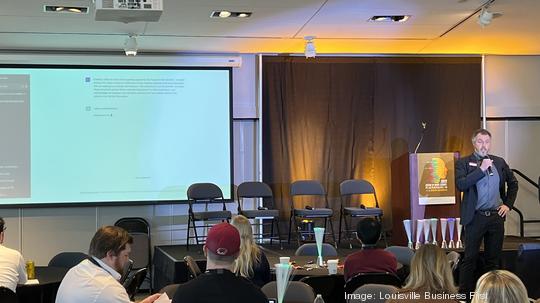
There were, though, purely human moments that would be hard for the latest and greatest AI technology to accurately capture.
One of them took place during a panel discussion by the name of “Advancing the Data Ecosystem Through Public/Private Partnerships” in which Eric Burnette, director of innovation for Louisville Metro Government, served as the moderator for a talk between four other key players in the creation and execution of the public-private partnership between the city and Microsoft (Nasdaq: MSFT) to form the Future of Work Initiative.
Those four others were Alan Berube, the interim vice president and president of the Brookings Institution; Raamel Mitchell, the global director of the Microsoft Black Partner Initiative; Grace Simrall, the chief of civic innovation and technology for the city; and Mary Ellen Wiederewohl, the president and CEO of Accelerator for America.
At one point Burnette and Wiederwohl (as team members of Louisville Forward) worked with Simrall to broker the digital alliance partnership with Microsoft that would lay the foundation for the Future of Work Initiative.
The quintet talked about the three-year partnership that began on June 7, 2019, and ran its course for three years before officially coming to a close on Dec. 31, 2022. The deal was initially for a little under $1 million, but overtime expanded to approximately $2 million through add-on funding from both Microsoft and other sources.
“I do want to say that Raamel was our constant — and thank goodness, really. I mean, I’m proud to call you a partner and a friend, Raamel, and so thank you for always being a champion for the city,” Simrall said to Mitchell during the discussion.
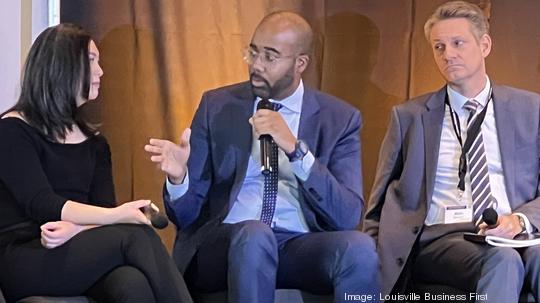
Before the Future of Work Initiative began, Simrall and Mitchell worked together on a separate digital inclusion event in 2018 with Brookings, who has been working with the Metro Government since the ’90s during the first Abramson Administration.
“We knew we wanted to do something bigger together,” Simrall later told me.
Berube talked about how with its size, Louisville fit the criteria of a “Goldilocks” city.
“You’re not too big, where the efforts are scattered and small and scale and sometimes competitive,” he told the crowd. “You're not too small either, right? You can get to scale at a place like this.”
He said ultimately what made Louisville stand apart from its peers was its overall “civic mindset.”
“That's why we keep coming back here is to help you all exercise that muscle. And … create models that work for public-private partnerships in other parts of the country, too,” Berube said.
Simrall added that many Louisvillians might take for granted at times how quickly the city “can convene a lot of people very quickly,” by getting not just the city government and private partners aligned, but academic partners and community partners as well.
“I think that’s part of what was so appealing about Louisville is that you got the sense that authentically, we were pulling all in the same direction,” she said.
Mitchell agreed, who later said that he was impressed with how “open” the city government was during the formation of the program. He said they could have chosen a smaller, less involved path, but they went the other direction.
“The conversation was, ‘Well, we'll make this progressive, right? Where it makes sense, we'll make those investments.We'll bring in other partners. We'll make sure that we have others at the table,’” he said.
The Louisville Future of Work Initiative went on to accomplish more feats than could reasonably fit into this article, but some of the highlights included:
- Engaging with 10,105 people through data training and network programs;
- Earning 2,143 digital badges through Microsoft;
- Providing 101 training programs and/or events;
- Having 1,531 people attend career development and networking events;
- Consulting Bellarmine University on beginning a Software and Data Engineering degree;
- Creating a diverse data science course for JCPS middle schools and high school teachers in partnership with the University of Louisville; and
- Developing a computer information systems major that is focused on, among other things, community empowerment, and African-American studies.
'We're actually creating more change'
These were just some of the statistics that were presented by Alisia McClain, the now-former executive director of the Future of Work Initiative.
In spite of all of these accomplishments, McClain did not want to bring a sense of finality to anything that sprang forth from the Future of Work.
“Let’s not think of it as a partnership coming to an end, but rather the iteration of the Future of Work in its current form is going to change into a different version of itself,” McClain told me.
McClain directed a team of five, each of whom now has a new chapter in his or her career. McClain herself is going back to the non-profit, TECH-Nique, that she started in 2018 as a way to engage underrepresented young people in the tech space. She makes her return able to see the tech ecosystem with a more holistic view.
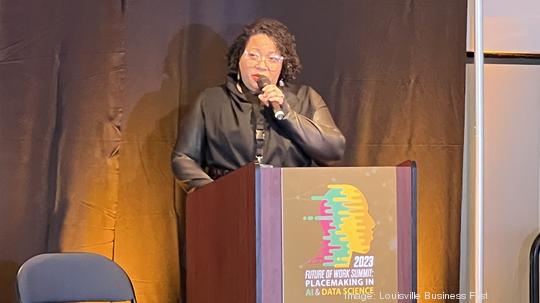
“I was a total unknown — and partnering with someone who was a total known in the community was a really interesting learning [opportunity],” she said. “It exceeded my expectations. It was much more difficult, much more frustrating, much more challenging, but also much more rewarding than I ever thought.”
She added although she had worked with partners, they were still working inside a silo, to an extent. Now, they can go forth and spread what they have learned to existing organizations in the community.
“So we're actually creating more change,” said McClain, who in December was on another stage when had a fireside chat with former Microsoft Joanne Harrell at the latest Women in Technology Conference.
McClain took over the role of executive director in April 2021, replacing Reno-Weber, who currently serves as the deputy director of the Health Equity Innovation Hub at the University of Louisville.
In conclusion (Note: If you see this at the end of a document, it’s probably been written by a bot), McClain and Reno-Weber stood side-by-side by the stage, referring to the panel discussion not as a graduation of sorts, but merely a milestone for the city.
“Think of it as we just built the first iPhone. Now, how’s that going to turn to the iPad and the Apple Watch? What’s the next iteration look like?,” McClain said.
The man wearing the bow tie who had the day’s first comments got the last as the break period ended.
“We built [the initiative] intentionally to be able to embed it into the ecosystem with sustainable institutions,” Reno-Weber said, “and that’s exactly what’s happening.”
